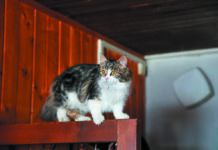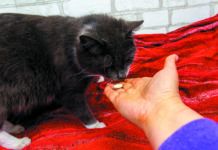Why Cats Get Stuck in Trees—And How to Get Yours Down
If you think about the fact that cats tend to jump down from high places rather than climb down, it becomes easier to understand why a cat who has climbed high up a tree may have difficulty descending. They climb in the first place either to chase an animal, escape from one, or simply because they like to climb and be high up. But once they get high enough, they know that jumping carries risk. Cats do survive jumps from extremely high perches but, contrary to popular opinion, not always—and not always without injury.
The Zoomies: Anything to Be Concerned About?
Behavioral scientists call them Frenetic Random Activity Periods, but you probably know them as the zoomies. We’ve all seen them. A cat goes from lounging languidly to tearing back and forth with no warning. It’s more common in kittens and other young cats, but many cats never grow out of the behavior completely. What drives it?
No Pets Allowed?
Q: There’s a building with an apartment available that I’d like to move into, and I’ve seen cats in some of the windows. But when I went to sign the lease it had a “no pets allowed” clause, and the fine print didn’t list any exceptions. I have held off but am figuring that since I’ve already seen cats there, bringing my own will just be a form of jaywalking and I won’t have any problems. What do you think?
Download The Full July 2024 Issue PDF
- Don’t Pursue Your Cat…
- Morsels: Things That Don’t Go Together: Your Cat and Narrow Spaces; Recognizing a Partial Seizure; In Your Cat’s Old Age; You May Need to Give More Frequent Manis and Pedis.
- What’s the Right Number of Meals to Feed Your Cat Each Day?
- Is it Dangerous to Let Your Cat Sleep in Your Bed?
- July 4th: Your Cat’s Least Favorite Holiday
- Should Your Cat Be an Indoor Pet or Indoor/Outdoor?
- Are NSAIDs the Right Choice for Long-Term Use in Cats?
- Dear Doctor
Don’t Pursue Your Cat…
If you’re in the mood to pay your cat some nice attention with stroking and cooing, it might not be the right time. You have to wait till he’s in the mood. Never try to chase or otherwise pursue your pet in a bid for togetherness. It will backfire.
Things That Don’t Go Together: Your Cat and Narrow Spaces
It can be hard to find room in the house for all your cat’s stuff: scratching post, food and water bowls, toys, bed, litter boxes. Many people relegate many or all of those resources to a back hallway, a staircase landing, or a mudroom off the kitchen. It’s understandable. It keeps the items close by yet more or less out of sight. But from your cat’s point of view, narrow areas like that make unnerving choices.
Recognizing a Partial Seizure
Drooling, eyelid or facial twitching, excessive vocalizations, growling, and weird head, neck, or limb movements. Each of these can be a sign of a partial seizure, which is much more common in cats than generalized seizures. Partial seizures are also harder to recognize for what they are, unlike a generalized’s seizure’s sometimes violent shaking and loss of awareness.
What’s the Right Number of Meals to Feed Your Cat Each Day?
Many people feed their cat twice a day—once in the morning and once in the evening—and cats in general seem to do fine on that schedule. Some people feed their cats just once a day, and even those pets appear to do okay, although they might like their food divided between two feedings in order not to get too hungry overnight. But if a cat had his druthers, he’d probably prefer several small meals a day—three, four, or even five. Why?
Is it Dangerous to Let Your Cat Sleep in Your Bed?
A number of years ago, researchers reported the case of a New Mexico boy who ended up with bubonic plague after he let his cat share his bed. It turned out the cat was infested with fleas who carried the disease, and the boy ended up with flea bites. Another woman who let her cat lick her awake every morning ended up with a serious sinus infection. Yet someone else developed lesions and itchiness on her trunk and arms after her cat, infested with mites, slept in her bed; she was diagnosed with a parasitic infection known as Cheyletiella blakei.
July 4th: Your Cat’s Least Favorite Holiday
It’s not just the booms of the fireworks that cats hate. It’s the comings and goings of people attending your barbecue, the overall differentness of the day. Cats derive so much comfort from things being predictable. When the flow of daily events is thrown off, your pet is thrown off, too. Here’s how to make the holiday more bearable for your feline family member.
Are NSAIDs the Right Choice for Long-Term Use in Cats?
When it comes to people, long-term use of nonsteroidal anti-inflammatory drugs (NSAIDs) like aspirin and ibuprofen are often thought of as problematic because they can cause problems ranging from a tendency to bleed too easily to stomach ulcers. There can be risks to the heart and brain, too. That said, under a doctor’s supervision, NSAIDs are sometimes prescribed to deal with chronic pain—pain that is not going to subside in a short time.
A feline high from second-hand marijuana smoke?
Q: Sometimes marijuana is smoked recreationally in our home, and I am worried as our cat does not seem herself when that happens. Am I imagining it, or could there really be some effects?















